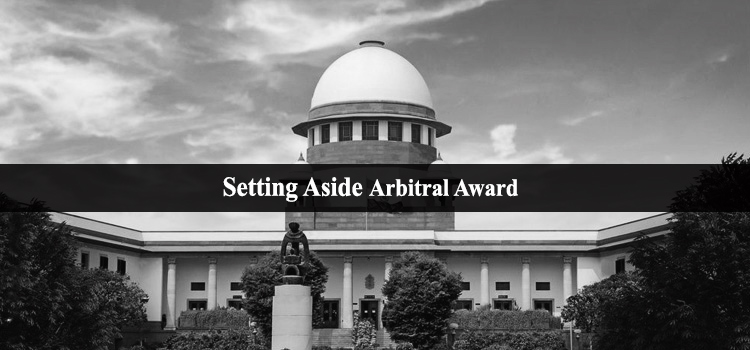Arbitration Act Section 34: Recourse Against Arbitral Award
Posted On : December 24, 2022

Table of Contents
The idea behind introducing alternative dispute resolution is to reduce the burden of courts from extended litigation. If everything that happens in the ADR proceedings becomes challengeable in the court of law, then there is no significance of such proceedings in the first place. The Arbitration Act section 34 restricts the court's interference in matters decided through arbitration. The section 34 of Arbitration and Conciliation Act, 1996 provides possible course of action against an arbitration award through courts of law. The grounds for section 34 Arbitration Act, 1996 are specifically furnished under clause 2. Anything that goes beyond the scope of section 34 of Arbitration Act restricts challenge before a court.
Grounds for Section 34 Arbitration Act, 1996
The Arbitration and Conciliation Act section 34 contains several grounds on which the arbitration award can be set aside by court. The scope of section 34 of Arbitration Act gives courts of law a specific path to follow while considering matters decided through arbitration as reiterated below.
● Incapacity
The parties to a contract should be capable of entering a contract. If the legal capacity to contract is challenged, the same applies to the incapacity for arbitration agreement as well. The incapacity mentioned here could be minority, unsoundness of mind, etc. Basically, it depicts a situation when a person is not capable of making serious decisions.
● Invalidity of Arbitration Agreement
If the agreement on the basis of which arbitration proceedings were conducted was itself invalid, then the arbitration award can not be regarded as a valid one.
● Lack of Proper Notice
If one of the parties has not been served with proper notice of the arbitration proceedings, appointment of arbitrator, etc. the Arbitration Act section 34 allows setting aside of the award.
In case of BSNL v. M/S Nortel Networks India Pvt. Ltd.[1], the apex court clarified that “There must be a clear notice invoking arbitration setting out the ‘particular dispute’ (including claims/ amounts) which must be received by the other party within a period of 3 years from the rejection of a final bill, failing which, the time bar would prevail.”
● Inability to Present the Case
If or not, both the parties have been given proper notice of the arbitration proceedings, both have the right to represent themselves before the presiding officer, i.e. the arbitrator. If one party is initiating arbitration, appointing the arbitrator, conducting the process through arbitration lawyers, while the other one has no clue of the proceedings, not getting a chance to bring their side of the story regarding the dispute, it is not a legal process. The principle of ‘audi alteram partem’ requires both the parties to be duly heard before arriving at a decision.
● Surpassing the Scope of Arbitration
There are specific disputes that can be resolved through arbitration as per law. If the matter resolved through the process is beyond the scope, the Arbitration and Conciliation Act section 34 allows setting aside the decision. The examples of such matters include family disputes, criminal offences, etc.
● Composition of Arbitration Tribunal in Question
The section 11 of Arbitration and Conciliation Act, 1996 lays certain rules regarding the appointment of arbitrators. As per law, both the parties to arbitration need to be on a consensus when it comes to deciding over the arbitration tribunal, whether it is one or more arbitrators. For example, if the international commercial arbitration required one arbitrator from each country whose parties are subject to dispute, non-compliance of the same is subject to challenge as per Arbitration Act section 34..
● Conflict with the Agreement
If the acts of parties contracting are themselves in contradiction of the terms specified in the agreement, such an arbitration award under section 34 of Arbitration Act is liable to be set aside by the court.
● Conflict with Public Policy
The grounds for section 34 Arbitration Act, 1996 specifically require that the decision made by the arbitration tribunal should conform with the public policy in India. If the arbitration award goes against the country’s public policy, it can be set aside regardless of both the parties to arbitration.
The apex court in case of Central Inland Water Transport Corporation Ltd. v. Brojo Nath Ganguly[2] held that “From the very nature of things, the expressions "public policy", "opposed to public policy" or "contrary to public policy" are incapable of precise definition. Public policy, however, is not the policy of a particular government. It connotes some matter which concerns the public good and the public interest. The concept of what is for the public good or in the public interest or what would be injurious or harmful to the public good or the public interest has varied from time to time.”
● Principles of Natural Justice
There are mainly two rules under the principle of natural justice: that a person should not be a judge in his own case, and that a person should be given a chance to be heard before deciding a matter. In case any of them is not duly followed while conducting the arbitration proceedings, the award of such proceedings can be set aside by the court.
● Patent Illegality
If on record of the arbitration award or otherwise, there is clear illegality as clarified under the scope of section 34 of Arbitration Act, the same can be challenged. Here, the section 34 arbitration act limitation also clarifies that the process of law, eg. a lack of proper application, will not constitute the instance of patent illegality.
In case of Associate Builders v. Delhi Development Authority[3], the hon’ble Supreme court elaborated ‘patent illegality under 3 sub-heads’. It includes contravention of substantive law of India, Arbitration Act, and the substance of the dispute.
Section 34 Arbitration Act: Limitation
By now, the solution for ‘how to challenge an arbitration award?’ is clear. But since it is a matter of courts of law, there is a time limit as well. The application for challenge against the arbitration award should be submitted within 3 months of receiving the same. However, additional 30 days may be granted in case of some procedural delay through authorities.
In case of The State of Maharashtra & Ors. v. M/s. Ark Builders Pvt. Ltd.[4], the hon’ble Supreme Court held that “the period of limitation prescribed under section 34(3) of The Act would start running only from the date when a signed copy of award is delivered to/ received by a party making the application for setting aside the award under section 34(1) of The Act.”
Regarding the limitation period, the apex court has also held that “The limitation period for filing the petition under Section 34 of The Act for setting aside an arbitral award would commence only after a signed copy of the award is received by the party from the Arbitral Tribunal.”[5]
Inference
By now, it is evident that arbitration awards are not absolute. If there is evident conflict with the applicable laws, the same can be challenged in the court of law. The reason behind the enlarged scope of section 34 of Arbitration Act, 1996 is that people often use ill practices while conducting the arbitration process. Sometimes, it is the service providers like banks, builders, etc. who keep their own interests in focus while conducting such processes in case of dispute. Arbitration Act section 34 is a provision which brings recourse for people who are at loss after the matter is decided single-sidedly.
[1] Bharat Sanchar Nigam Limited v. M/S Nortel Networks India Pvt. Ltd., Civil Appeal Nos. 843-844 OF 2021.
[2] Central Inland Water Transport Corporation Ltd. v. Brojo Nath Ganguly, (1986) AIR 1571, 1986 SCR (2) 278.
[3] Associate Builders v. Delhi Development Authority (2015) 3 SCC 49.
[4] The State of Maharashtra & Ors. v. M/s. Ark Builders Pvt. Ltd. (2011) 4 SCC 616.
[5] Benarsi Krishna Committee & Ors. Vs Karmyogi Shelters Pvt. Ltd. (SLP Civil No.23860) of 2010.
























